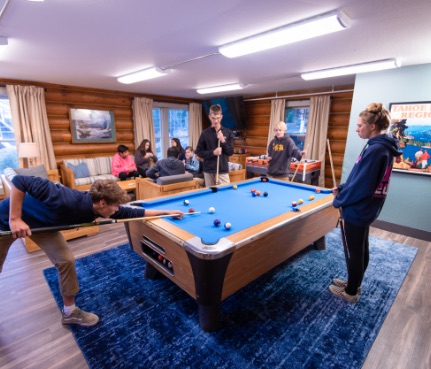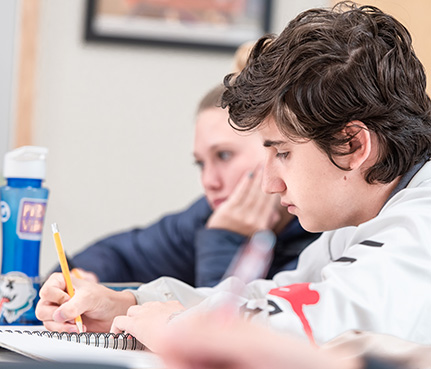Curiosity Over Control: Teaching Self-Advocacy Skills to Teens
August 29th, 2025
How Reframing Teaches Self-Advocacy Skills
How Self-Advocacy Skills Benefit Students With Learning Differences

When teenagers discover something new about themselves, something that improves how they function or boosts their capacity, there’s a shift in how they approach learning.
They sit up straighter. They stop waiting to be told what to do. They take initiative—not because someone said they should, but because it feels good to finally understand what helps them thrive. These shifts don’t come from pressure or rules. They come from curiosity.
Why Telling Kids What They Need Backfires
Walk into most high schools and you'll hear a lot of directing: "Sit here." "Use this strategy." "You need extended time." Adults mean well, but there's a problem with this approach. For the majority of their childhood, students have learned to follow directions rather than think for themselves.
But then, when they get into college, there’s no one to tell them what to do. Students who’ve been micromanaged throughout high school suddenly have to determine how much sleep they really need to function optimally the next day or which study habits work best for them. And when to ask for help. Many students struggle because they never truly learned to understand their own needs.
The Power of Getting Curious About Yourself
Teenagers are curious about everything— except sometimes themselves. When we help students get curious about how they work best, everything changes.
"A big theme that I try to teach them is curiosity over control," explains Ms. Miranda, one of our specialists at Lake Tahoe Prep. "I'm trying to tell them to be curious about themselves and to be curious about what they need."
What's different about curiosity? It feels like an investigation, not instruction. When a student realizes they understand math better when they can talk through problems, that's their discovery. When they notice they focus better in the morning, that insight belongs to them.
How Students Actually Learn Self-Advocacy Skills for Themselves
Self-advocacy skills for students resemble genuine self-discovery.
Start with Self-Observation
Students begin by paying attention to their own experiences. When do you feel sharp? What makes assignments feel impossible? Which teachers explain things in ways that click for you?
We're not looking for problems to fix. We're looking for patterns to understand.
Asking Different Questions
Instead of asking, ‘what’s wrong with you?” we ask, “What’s working for you?”
These questions don't have right or wrong answers. They're genuine curiosity about how each student's mind works. They’re real, open-ended, and honest. And they help students pay attention to what helps, not just what hurts.
Experimenting with Solutions
Once students notice patterns, they can test ideas. The morning person might ask to take their hardest class first period. The student who thinks better while moving might try standing at their desk or taking walking breaks.
Reflecting on What Happens
The key is checking back: How did that work? What did you notice? What might you try differently?
Why This Approach Works for All Students
This kind of learning—where students are asked to pay attention to what works for them—isn’t just for students with learning differences. It helps all students.
When we treat every learner like someone worth listening to, they show up differently. They start looking for what helps them feel steady, focused, or motivated—not what they “should” be doing to fit in.
Some students need silence to concentrate. Some think better while pacing. Some want structure; some do best when they can move things around. That kind of variation is normal—and helpful.
The point isn’t to make learning easier. It’s to make it more honest. And that starts when students realize their experiences are worth paying attention to.
Pronounced Benefits for Students With Learning Differences
Self-Advocacy Benefits for Students With Learning Differences

For students with learning differences, learning how to advocate for themselves isn’t just helpful—it’s often a turning point. When they understand what works and feel supported in speaking up, they’re more engaged, more confident, and less likely to shut down when things get hard.
Interestingly, research backs this up. One study found that students don’t just need to know how to advocate—they need to believe it will make a difference. That belief, sometimes called self-efficacy, turns out to be the key ingredient.
College preparatory boarding schools offer several advantages:
- They start asking for the tools or settings they need before problems pile up
- They stop feeling like support is something to be embarrassed about
- They begin participating more actively in IEP or accommodation meetings
- They’re more likely to adjust strategies on their own, without waiting for a teacher to step in
- They move from compliance to collaboration—they’re part of the process
When students are part of the solution, they stop seeing their differences as something to work around— and start seeing them as something they can work with
The College Payoff
Students who understand themselves show up to college differently. They don't just know they need certain accommodations - they can explain why. They don't just request help - they can describe specifically what kind of help would be most useful.
More importantly, they can adapt.
Self Advocacy Beyond Academics
Once students practice advocating for themselves in safe, nurturing environments, it starts to show up in other areas of their lives, too.
They are more likely to ask a boss to explain something again rather than pretending they understood and then having to deal with the consequences of getting it wrong or not performing at all. They are likely to recognize when they are becoming overwhelmed and needing to take a step back instead of pushing themselves to the point of burnout.
And most importantly, they learn to ask for help that feels honest, not hopeless.
These are skills students will carry with them long after graduation. Self-advocacy isn’t just about getting through algebra. It’s about learning how to move through the world without giving yourself away.
A Different Way of Thinking About Education
Most schools focus on what students should learn. We also think about how they learn best. Most schools try to standardize approaches. We celebrate the different ways students can succeed.
Ready to watch your teen thrive in our boarding school environment? Connect with us to learn more about how we empower students through developing self-advocacy skills!









